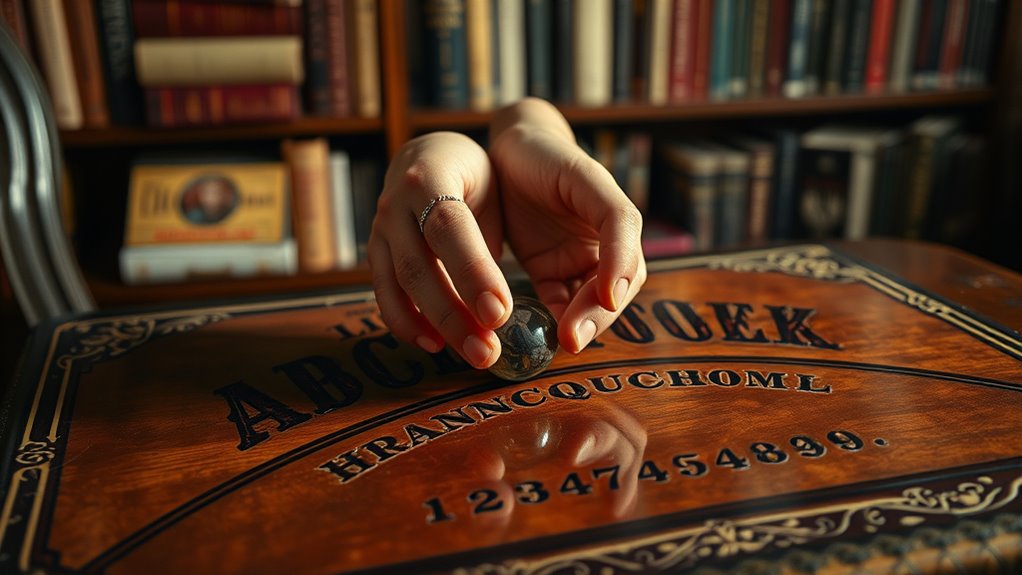The Ouija board myth isn’t about communicating with spirits; it’s rooted in psychological effects, like the ideomotor phenomenon. When you place your fingers on the planchette, subtle, involuntary movements can make it seem like the board is responding. People often misinterpret these movements as supernatural messages, especially in group settings where emotions run high. Understanding this psychological basis reveals the truth behind the Ouija experience—keep exploring to uncover even more fascinating insights.
Key Takeaways
- Ouija board movements result from the ideomotor effect, causing involuntary muscle movements rather than supernatural influence.
- Blindfolded users often produce random, incoherent messages, indicating psychological factors over paranormal activity.
- Historical context reveals Ouija boards were initially marketed as toys, not serious tools for spirit communication.
- The human desire for connection fuels interpretations of Ouija experiences, emphasizing psychological dynamics over supernatural claims.
- Collective gatherings enhance the allure of Ouija boards, but emotional reactions can be better understood through psychological support.

Although Ouija boards have long been associated with the supernatural, the truth behind their mysterious allure is rooted in psychology rather than paranormal activity. When you sit down with friends, placing your fingers lightly on the planchette, the movements you experience aren’t conjured by spirits but are instead shaped by something called the ideomotor effect. This phenomenon explains how your subconscious can lead to small, involuntary movements, making it seem like the planchette is moving on its own. Acknowledging feelings during separation can also help individuals process their emotions, which may parallel the Ouija experience of seeking connection.
Scientific studies bolster this idea, showing that blindfolded users tend to produce random letters and incoherent messages when using the board. This randomness emphasizes that the operation of the Ouija board hinges on psychological factors rather than any supernatural forces at play. It’s easy to get caught up in the excitement of what feels like genuine communication, but the evidence suggests otherwise.
The history of Ouija boards further supports this notion. Originally marketed as toys and party games during the Spiritualism movement of the 19th century, they weren’t designed to serve as serious tools for contacting the deceased.
Originally marketed as toys during the 19th century Spiritualism movement, Ouija boards were never intended for serious spirit communication.
Research led by Marc Andersen highlights an interesting aspect of the Ouija experience: participants often feel less control during sessions. This feeling can lead to misattributing their movements to external forces, which plays into the idea of supernatural influence. When you gather with others, the collective desire for connection, coupled with the thrill of the unknown, can create an atmosphere ripe for interpreting the Ouija board’s activities as genuine communication. Finding solace in support groups can also help individuals understand their own feelings and reactions during such experiences.
Despite the evidence that debunks the myth of the Ouija board as a genuine means of contacting spirits, many users still find themselves enchanted by the idea. This fascination stems from a deep-seated human desire to connect, not just with one another, but with something beyond ourselves. The psychological mechanisms at play can be powerful, fueling interpretations of unexplainable experiences as supernatural encounters. Engaging in this collective experience can also reveal personal boundaries that individuals may need to establish for their emotional health.
In the end, while it’s tempting to attribute the board’s movements to ghostly forces, understanding the ideomotor effect and the psychological underpinnings of the Ouija experience reveals a more grounded reality. Debunking the myth doesn’t diminish the allure; it merely invites you to appreciate the fascinating interplay of the mind and social dynamics that make the Ouija board a staple of curious gatherings.
Frequently Asked Questions
What Does God Say About Ouija Board?
When you ask what God says about Ouija boards, it’s essential to contemplate biblical teachings.
Many scriptures caution against seeking guidance from mediums or engaging in divination. Instead, you’re encouraged to rely on prayer and scripture for spiritual insight.
Engaging with Ouija boards may lead you away from true faith and expose you to spiritual dangers.
Trusting in God’s word is crucial for your spiritual journey and protection.
Is Ouija Based on a Real Story?
You might say the Ouija board has a story as enchanting as a ghost tale told around a campfire.
While its origins stem from the Spiritualism movement in the late 19th century, there’s no true story behind it connecting to actual supernatural events.
Instead, it’s a product of cultural fascination and psychological phenomena, drawing you into a world of mystery without any real evidence of communicating with the dead.
Why Were Ouija Boards Banned?
Ouija boards were banned in various places due to concerns over their ties to occult practices and potential psychological harm.
Many religious groups labeled them as tools for demonic communication, pushing for prohibitions in certain communities.
In the 1920s, several U.S. states attempted to regulate or ban them amid fears of fraud and exploitation.
Educational institutions also restricted access, worried they’d promote superstitious beliefs among students, reflecting societal anxieties about their use.
Why Did the Ghost Want People to Stop Using the Ouija Board?
Like a shadow lurking just out of sight, the idea that ghosts want you to stop using Ouija boards stems from fear.
This fear often arises from stories and films that depict malevolent spirits. People claim spirits warn against using these boards to avoid attracting negative entities.
However, it’s more about your psyche reacting to the unknown, making you feel like there’s a ghostly presence trying to protect you from harm.
Conclusion
In the end, the Ouija board isn’t a magical portal to the beyond; it’s more like a party game gone awry. You’ve got the power to create your own narratives, just like those old-school ghostbusters in the ‘80s movies. The movements of the planchette are simply the result of your subconscious mind at work. So, next time you gather your friends for a spooky night, remember: it’s all in good fun, not a ticket to the afterlife.









